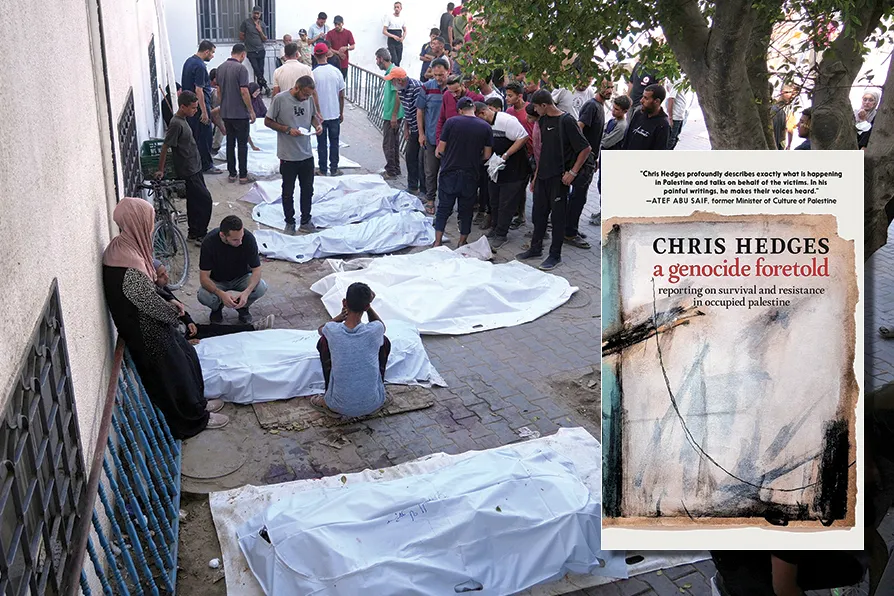CHRIS SEARLE speaks to Nicaraguan guitarist OMAR RIOS MELENDEZ
JOHN HAWKINS welcomes the passion, grief, precision and elegance of an eloquent witness of genocide

 ETHNIC CLEANSING: Palestinians mourn, outside the Shifa Hospital, Gaza City, over the bodies of those killed in Israeli strikes last Monday
ETHNIC CLEANSING: Palestinians mourn, outside the Shifa Hospital, Gaza City, over the bodies of those killed in Israeli strikes last Monday
A Genocide Foretold: Reporting on Survival and Resistance in Occupied Palestine
by Chris Hedges, Seven Stories Press, £14.99
ACCORDING to Judeo-Christian mythology, the human race began as exiles and migrants and, soon enough, it moved on to murder, with Cain, the first human born, killing Abel, the second born, purportedly over jealousy of God’s favour. Seth, the third son, represented the first Never Again moment, and a reboot of humanity.
Millennia later, we’re still at it, trying to get it right; still finding it difficult to follow a simple biblical commandment: don’t kill — not physically, not emotionally, not economically — and we might have ourselves a little Eden here; an acre or so of heaven on earth. But we don’t seem up to the task. The carnage in Gaza proves that.
Chris Hedges writes with passion, grief, precision and elegance in his latest book, A Genocide Foretold, as he describes the ethnic cleansing taking place in Gaza under the gaze of world activists, NGOs, and a seemingly reluctant mainstream media.
Hedges won a 2002 Pulitzer Prize as part of the New York Times staff for its reporting on America’s new war on terror. He has written many books on social, political and cultural issues, including War Is a Force That Gives Us Meaning (2002), American Fascists: The Christian Right and the War on America (2007), and Days of Destruction, Days of Revolt (2012), which chronicles life in poverty in different parts of the United States.
Hedges began writing A Genocide Foretold in September 2024 from the West Bank, noting that he hadn’t been back in two decades. He writes with a sense of spatial history: “We are driving the winding road that hugs the barren sand and scrub hillsides snaking up from Jericho, rising from the salt-rich Dead Sea — the lowest spot on Earth — to Ramallah.” He notes the colonist settlements: “They have grown in number and expanded in size. But they remain protected by blast barriers, concertina wire, and watchtowers surrounded by the obscenity of lawns and gardens.” This is an image reminiscent of Martin Amis’s The Zone of Interest. Hedges observes “the feel of an open-air prison.”
In his opening chapter, The Old Evil, Hedges gets the reader’s senses busy and the mind prepared for human misery. “It comes back in a rush,” he writes, “the stench of raw sewage, the groan of the diesel, sloth-like Israeli armoured personnel carriers, the vans filled with broods of children driven by chalky-faced colonists, certainly not from here, probably from Brooklyn or somewhere in Russia, or maybe Britain. Little has changed.”
The colonists come from all over the globe.
Same-old same-old in Palestine. New generations of Palestinians are begat; when they reach their teenage years many of them are mown down by the Israeli forces; survivors limp into adulthood and old age with their traumas; new generations are begat. The genocide Hedges depicts has been “in slo-mo” for generations, and now, since October 7 seems in full erasure mode. With American co-destruction.
Hedges, who has covered wars in Iraq and the Balkans, muses on the crucial importance of press reporting from war zones. “Writing and photographing in wartime are acts of resistance, acts of faith,” he writes. The word faith is a key word for Hedges, who along with courageous journalism, is a Presbyterian minister. Images and words “chronicle not only the facts, although facts are important, but the texture, sacredness, and grief of lives and communities lost,” he writes. Hedges says that’s why journalists are targeted and murdered by Israeli forces.
A Genocide Foretold has 11 chapters of top quality oral history, journalism and humanity, and tells the story of the colonial obliteration of a people in real time. Hedges writes: “The death mask of colonialism — too often of European extraction — does not change. Nor does the god-like authority of colonists who look at the colonised as vermin, who take a perverse delight in their humiliation and suffering, and who kill them with impunity.”
It is a highly recommended read.

PAUL BUHLE recommends an eminently useful book that examines the political opportunities for popular anti-fascist intervention

PAUL BUHLE agrees that a grassroots movements for change in needed in the US, independent of electoral politics

ALEX HALL follows the battered fortunes of Syria, a multi-ethnic country caught in the crossfire of competing imperialist interests

RON JACOBS welcomes the translation into English of an angry cry from the place they call the periphery










